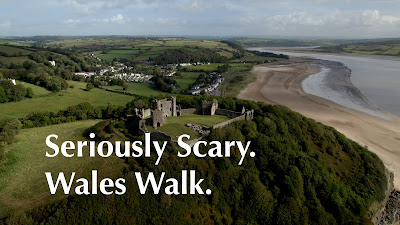Safety Spotlight – ‘Tech up’ in case of trouble
Help
us to help you
If
you get into trouble around our coasts and/or in the water, minutes matter. Calling
for help and letting us know where you are so we can find you quickly can make
all the difference between going home for a cuppa… or never going home again.
As
part of Maritime Safety Week, we’ve been ‘talking tech’. Equipping yourself
with some technical back-up is surprisingly easy, whether you’re tech-savvy or
tech-averse.
 |
| Credit: Friends of Portheras Cove. Our search and rescue helicopters have trained paramedics on board |
Tech that saved a life - kayaker
Tech
and the right safety equipment almost certainly helped to save the life of a
man last month. A keen kayaker, he’d fallen out of his kayak in choppy
conditions off the coast of North Devon and was struggling to get back in. He
was wearing a lifejacket but was getting increasingly cold and tired after he’d
been in the chilly water for 40 minutes.
He pressed his DSC distress button on his VHF radio
and HM Coastguard quickly put out a Mayday Relay requesting assistance from
nearby vessels as well as sending Ilfracombe Coastguard Search and Rescue, the Inshore
Lifeboat from RNLI Ilfracombe and the search and rescue helicopter from Newquay.
The man was located by the helicopter before being taken aboard the lifeboat
where he was checked over and taken back to the safety of dry land. Having a way
to contact the Coastguard as well the correct safety equipment, ultimately
saved his life.
Matt Leat, the
MCA’s Head of Infrastructure for HM Coastguard said:
“Preparation is key so you can enjoy the water safely. It doesn't take
long at all to set yourself up. Having your mobile phone charged and set up with
some apps takes minutes and knowing what to do is key. Also, if you're going
out with other people, if something bad happens, it's really good to know how
to use their safety kit as well.
“There are
some easy and quite cheap ways of keeping yourself safe and enjoying the amazing
coastline that we've got around the UK.”
For more tips from Matt and his colleagues, listen to him with his team ‘talking tech’ in our latest podcast here: Talking Tech for safety podcast
 |
| Credit: Ilfracombe Coastguard Rescue Team |
What to choose and use
Mobile phones: Most
of us now have mobile phones and putting them in a waterproof case, if you’re
out on the coast, is a great idea as you’ll still be able to call 999 and ask for the Coastguard to help if
you find yourself unexpectedly in the water.
Apps: We live
in the ‘age of the app’ and many smartphones now have GPS in them (Global Positioning
System which pinpoints geographical locations) and other apps are really useful
such as Google maps, Ordnance Survey maps and other widely available location apps.
There are also lots of free weather and tide times apps so you can check the
predicted conditions before you set out.
SafeTRX: The
RYA’s (Royal Yachting Association) free SafeTrx app is also useful, not just
for sailors but anyone using the coast – whether you’re an angler, a
paddleboarder or a walker. You can add in your emergency contact details and if
you get into trouble and call for help, your location is automatically updated
in the app and available to the rescue services.
PLB
(Personal Locator Beacon): Especially good for anyone who loves the great
outdoors. Increasingly affordable, they can be used all over the world and in
remote locations. If you get into difficulty, you can set it off and the
nearest emergency services will be alerted.
VHF
Radio with digital selective calling: Very useful for all water users and extra
back up in the event of no mobile phone signal or limited battery life.
EPIRB, Emergency positioning-indicating radio beacon. An essential piece of kit for vessels. You need to register it to your vessel and when activated, it will transmit the location and if it has GPS capability, it will broadcast an accurate position of the vessel.
In an emergency, call 999 and ask for the Coastguard.
Useful Links
https://www.rya.org.uk/knowledge/safety/look-after-yourself/equipment-for-uk-pleasure-vessels/406-mhz-epirb-and-plb


